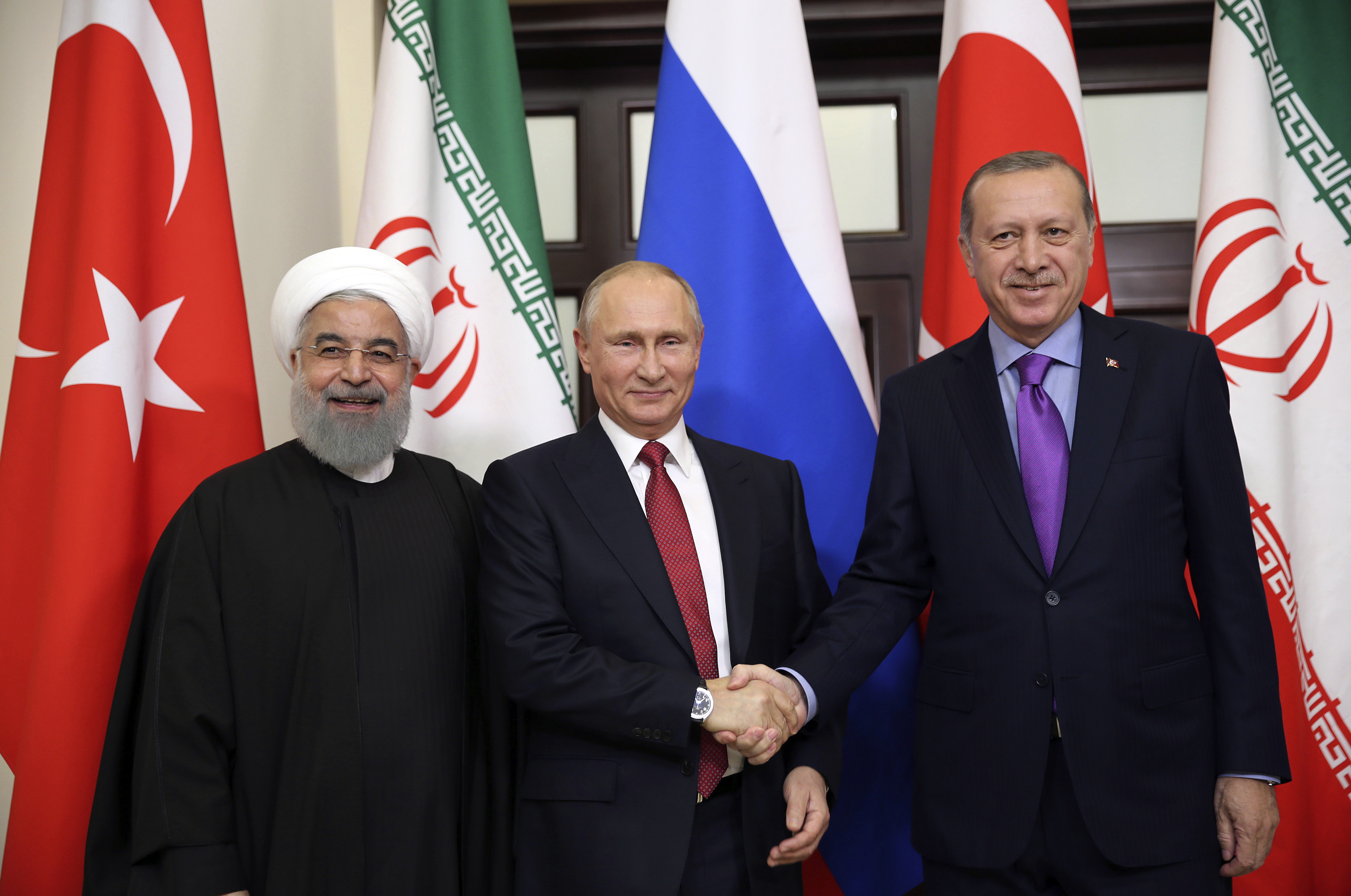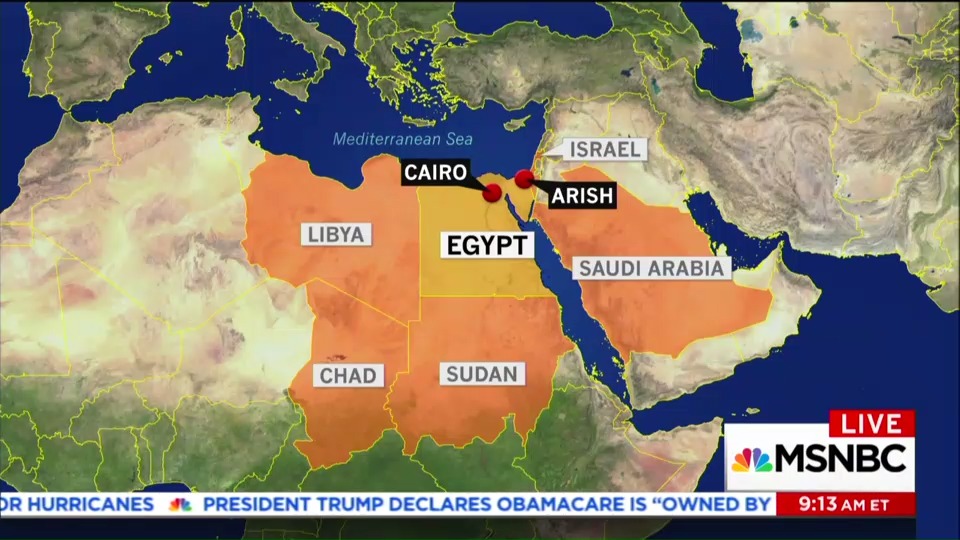After major losses in Syria and Iraq, the self-proclaimed Islamic State (ISIS) is seen as a diminishing threat — and President Donald Trump has declared the armed group defeated. But while it’s true that the group has lost a lot of territory in the Levant and has seen its “caliphate” crumble as they get pushed out of cities in and villages after often months-long bloody battles, is it really down for the count?
Its defeat in Raqqa — a city in northern Syria declared the capital of the ISIS “caliphate” — represented what Mona Yacoubian, Senior Policy Scholar at the United States Institute of Peace, called “a significant, strategic and symbolic loss” for ISIS. But it by no means spells the end of the group. Yacoubian cautioned against mistaking short-term military victories for long-term success, and worries that the United States, as it has in the past (under the Obama administration in Iraq, for instance), will pull back rather than stay and try to figure out a non-military way to “sustain change on the ground.”
“I’m very concerned that they’ll just tick the boxes and move on,” Yacoubian told ThinkProgress, adding that she could see an “ISIS 2.0” or other extremist groups emerging from the ashes of what’s left of the group in the Levant.
“Let’s not forget that our primary national security objective in Syria as of 2014 shifted to defeating ISIS,” said Yacoubian.
Of course, the U.S. military presence is Syria is not something the Syrian regime welcomes, so the fight against ISIS — or extremist groups — will have to rely on more than just American boots on the ground.
Hassan Hassan, a senior fellow at Tahrir Institute for Middle East Policy said that what the United States has to do in Syria is “minimal” — using its minimal footprint to help locals maintain control of territories that will “eventually be incorporated into a Syrian state.” But ultimately, he said that he feels that Syria will either fall to the jihadists or to the regime of Syrian President Bashar al-Assad.
“I say this because I know the United States is not willing and will not do anything in the future… The United States will eventually just pack up and leave, and not do the right thing. We’ve seen patterns over the past two years in Syria and Iraq, where they state certain logic, but don’t follow up with that logic,” he said, adding that going back to the Obama administration, “They always said the right thing, but did the wrong thing, eventually.” Iran and Russia, however, are not going anywhere.
The Trump administration, he said, has only compounded the problems by relying more on militias, for instance.
“The people who have remained with ISIS so far are the most committed, and unhinged. So they will continue to work for them and be sleeper cells,” he told ThinkProgress. “A lot of them were never known, not even to the locals, because they always wore masks and working in the security forces, and those units are specialized in what comes next for ISIS — building IEDs (improvised explosive devices), assassinations, infiltration — so what remains of ISIS is very important for its next stage.”
There’s a chance in Syria for the Syrian Defense Forces (SDF) to provide security and keep extremists — not just ISIS, but the remains of other groups, such as Jabhat al-Nusra — at bay, he said.
“There is now a window of opportunity for the United States to not only prevent the return of the jihadists, but the return of the U.S. again to fight a war that they’ve already fought,” said Hassan.
ISIS beyond Iraq and Syria
Syria and Iraq aside, ISIS has been recruiting and launching attacks not just in the Middle East, but also in Africa, Asia, and Europe.
The group has been especially active in Libya, where the group was targeted by U.S. airstrikes in September and has engaged in increasingly bold attacks in neighboring Egypt. Just last week, ISIS took responsibility for an attack on a Sufi mosque in Sinai that left 305 dead and scores injured. The group is also causing havoc in Afghanistan, at times cooperating and at times fighting against the Taliban.
Nicholas Heras, Fellow at the Center for a New American Security working in the Middle East Security Program, said that Libya is in a sense ideal for for ISIS — it is poorly governed, has lots of desert and mountain space where the group can hide out, no shortage or arms or militants it can recruit, and is an almost perfect space for the group to plan and launch any attach on Europe.
“ISIS had, in Sirte, a proto-state, which has been defeated, but it has maintained its networks in southern and central Libya and is still present in places such as Sabratha and Benghazi and some other places,” said Heras, adding that ISIS, like al-Qaeda, benefits from being able to blend into the local militant councils in the region, where they’ve already been recruiting from nearby Tunisia and the trans-Sahara region.
“Libya is so important. Beside its oil wealth, there are security vacuums everywhere, its geography lends itself to finding places for training camps, to have remote bases of operation, to have very difficult to track — and disrupt — lines of supply and reinforcement,” he said. And then there’s the proximity to Europe.
“For them, the Mediterranean is a highway, not a barrier,” Heras told ThinkProgress. The group will have a harder time in Afghanistan, where it’s going up against the Taliban, which, seeking to be part of the government, is not just a rag-tag militant group, but deeply entrenched in Afghan communities. Taliban also has cross-border reach into Pakistan, which ISIS does not enjoy.”
But will the group leverage its established – if damaged – networks in Iraq an Syria to spread elsewhere? Or will it walk away from the oil-rich land it once held? Will the fighters who evaded capture simply blend back into the population and refrain from fighting with other groups? It seems unlikely that ISIS fighters will just accept defeat in Syria and Iraq and disappear.
One possibility, according to the Washington Post, is that ISIS can reconfigure with women as its “next incarnation” – something Heras said is very possible.
“The way that they can help support ISIS in its next stages is by keeping its ideology alive. The wives of ISIS fighters, if they fled with their children, can raise their children in a manner that would continue to build the mission that ISIS has,” said Heras.
“Skilled workers that were part of the administration or whatnot can continue to be potential key conduits in the ISIS attack networks – all the more, if they have passports that allow them to enter other countries,” said Heras.
“ISIS continues to present a challenge because it has predicted its demise, if you will, that when the U.S. began to build the global coalition against ISIS, ISIS began to set the stage for it to go to ground, to make the argument that its battle would continue well after Raqqa fell and well after Mosul fell,” he said.
‘A new phase in the battle’
Given the game of whack-a-mole the United States has been playing in the Middle East and central Asia, where one extremist group dissolves only to give way to another, it seems logical to wonder what will replace ISIS if not just another branch of ISIS elsewhere.
“ISIS is trying to sell its defeat, or the collapse of its territorial ‘caliphate’ as a new phase in the battle, in which it will wage an insurgency against its opponents, particularly its foreign opponents and its enablers, where local, in Syria and Iraq or regional such as Arab Gulf countries and others,” Heras said. For instance, ISIS has been particularly focused on Saudi Arabia because that is where two holy sites, Mecca and Medina, are located. And ISIS, with its own ideology, is competing with the Saudi government as a superior leader for the Muslim community.
Heras also pointed to the network of ISIS operatives in Turkey, where thousands of ISIS sympathizers or former fighters have gone to ground. From their base there, he said, they continue to look for ways to enter the European Union. Its fighters could either abandon the fight, join other groups in Syria and Iraq or elsewhere or maybe become part of organized sleeper cells that could activate at a later date.
“What made ISIS more ambitions than other Salafi, jihadist organizations was that it created what it thought to be a ‘‘caliphate’ and it made a global appeal using emerging communication technology, particularly social media. It was particularly savvy at mobilizing and employing members of the organization that could speak different languages…to try to appeal to a global mission, that it was an epic movement shaping the future of Islam,” said Heras.
The group has very different ways to strikes, using local fighters that could blend into the population, or foreign fighters that could leave and do the same in neighboring countries (for instance, Chechen fighters that could go to Turkey).
ISIS he said, is “adaptable and mestastasizes” – he points to the what happened in the Philippines, where ISIS managed to co-opt local jihadists into their cause, leading to months of fighting in Marawi. In addition to Libya (where ISIS recruiters have been sending fighters since 2015) Egypt, and the Sahel region, Heras said that China might also become a hub for the group, who might find increasing support among the persecuted Uighur community there. This is largely the same tactic ISIS is trying to employ in recruiting local Bedouins in Egypt’s Sinai Peninsula or in Mali.
Heras is somewhat optimistic that the United States has learned lessons over the past few years, and that it “is better prepared to view this conflict against global, salafi, jihadist organizations as a marathon and not a sprint.”
Hassan, himself a Syrian, is more circumspect when it comes to whether the United States will take advantage of the current window of opportunity and make the right strategic moves in his country of origin.
“It would be sad — to use the president’s term — to have two generals who were associated with the two biggest failures in Iraq, namely Fallujah and Tel Afar, and namely, [Secretary of Defense] General [James] Mattis and [National Security Advisor] General H.R. McMaster, respectfully, do the same things again — to destroy areas and end up having jihadists come back to control the town,” said Hassan, “The jihadists too will have a window to return.”


